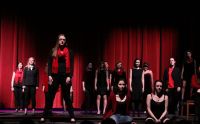After fighting for months for Student Affairs’ support, Women’s Empowerment successfully put on its production of The Vagina Monologues this past weekend in Collins Auditorium. The fight was well worth the effort, as the cast and crew of The Vagina Monologues gave an extremely powerful and moving performance. The various monologues were thought-provoking; they associated the vagina with female empowerment and made it the ultimate embodiment of femininity, a theme the audience embraced with cheers and laughter.
Directed by Wilmarie Cintrón-Muñiz, FCRH ’15, Kara Kratcha, FCRH ’15, Madelyn Murphy, FCRH ’17, Christiana Shovlin, FCRH ’16 and Jane Skapek, FCRH ’16, the show featured more than 20 actors in 13 monologues.
The overall production of the show was minimal. The stage was sparsely set, the costumes were made up of black clothing and red accents and the primary lighting was spotlights on the actors as they performed. However, the simplicity was extremely effective in allowing the audience members to focus solely on the content of the monologues and on the messages of the show itself.
The monologues are from playwright Eve Ensler’s interviews with women about their vaginas, during which she asked questions like “What would your vagina wear?” and “What would your vagina say?”
Each monologue presents a woman’s experience with her vagina and her sexuality. The Vagina Monologues began with a group performance discussing the surprisingly vast and curious array of nicknames across the United States for the vagina. The entertaining introduction really underscored the diversity of women and how they see themselves.
The most touching piece was easily “My Vagina Was My Village,” told by Vanessa Agovida and Alexandra Leen. This monologue told the story of a Bosnian woman who was raped by soldiers during the war in Yugoslavia, which the playwright artfully contrasted with another woman’s more pleasant, innocent story. Agovida delivered the Bosnian story barefoot and curled on a chair, a picture of vulnerability. The tears and raw emotion she employed in her performance were overwhelmingly powerful and left the room completely silent from the horror and realness of the monologue.
In another monologue, a woman poetically and intimately recounted a workshop that she attended to better know her vagina. The woman’s ignorance and shyness about her own vagina and orgasms were sad but endearing. However, the woman’s description of making herself orgasm for the first time, and thus finally embracing her sex for what it is, is inspiring and moves readers to feel happy for her and cheer her on.
Audience members noticed the variety of topics the monologues covered. “I was struck by how happy and comedic in tone it began and then how intense it gets further on in the play as it starts to approach darker themes like sexual assault,” Benjamin Shull, FCRH ’16, said.
The cast also performed the controversial monologue, “The Little Coochie Snorcher That Could” in which a woman recounts how her dad’s friend raped her when she was a child. However, a 24-year-old woman later had a one night stand with her and thus “saved” her when she was 16. This later version of The Vagina Monologues excluded the controversial line “If it was rape, it was a good rape,” which praised the sexual encounter between the protagonist and the older woman.
Also it changed the protagonist’s age from 13 to 16, perhaps to avoid legal problems since the minimum age of consent in many states is 16. Even so, some audience members, like Maddy Kimball, FCRH ’15, were not comfortable with the monologue.
“That’s still a woman beyond her college years snatching up a high school girl she didn’t even have history with for a one-night stand,” Kimball wrote. “If it had been a male 24-year-old, it would have been portrayed as creepy. In this context, it was played off as, ‘Girl Abused by Men Is Shown the Wonders of Lesbian Sex.’”
Despite what may be a disturbing romanticization of a woman raping a young girl, the woman’s experience and her view of herself were still carefully and intimately treated, and Kimball thinks the show as a whole was still worth watching.
“I thought there was a lot more to praise in the show,” Kimball said. Everything that’s worth watching is controversial, and harping on the one thing that could have been done better without paying attention to all that was done right is exactly how these things get banned.”
Considering that The Vagina Monologues first premiered in 1996, the show adds a new monologue every year to stay up to date and highlight a current issue that affects women around the world.
Students agreed that they would be interested in seeing The Vagina Monologues again. “I think it should be hosted again. I think it’s valuable,” said Samantha Banellis, FCRH ’16.
“It brings up really valuable topics, especially like how they mention the assault on college campuses and that there was just that story that just came out,” Elena Muse, FCRH ’16, said in reference to The Fordham Ram’s article, “Fordham Has Led Jesuit Schools in On-campus Sex Assault Claims, Data Reveals” (v. 96 i.3).
The $5 admission per attendee benefited Concourse House, an organization that provides families with safe, stable and transitional housing to eliminate homelessness, and offers a variety of social services and interactive programs that promote growth and independence to help families out of poverty.
While the production of The Vagina Monologues certainly was not easy to watch, it was pulled off with a sense of grace, professionalism and passion.





